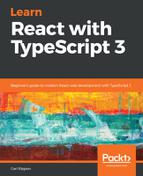We've learned some of the more advanced types in TypeScript in this chapter, starting with union types. Union types are extremely useful, allowing us to create new types by unioning existing types together. We discovered that unioning together string literals allow us to create a type that is more specific and type-safe than a regular string.
We explored various ways of implementing type guards. Type guards are useful to help the compiler narrow down a union type in branches of logic. They are also useful when working with the unknown type to tell the compiler what the type is in branches of logic.
Generics, as the name suggests, allow us to create generic types. Having covered this topic in detail, the type-safety for props and state in React components makes a lot more sense now. We will continue to use generic classes and functions heavily in the rest of the book.
We learned that overload signatures allow us to have a function that has different parameters and return types. We can now use this feature to good effect to streamline public functions we expose in a library.
We learned about how we can dynamically create new types from existing type properties using both lookup and mapped types. We are now aware that there are lots of useful standard TypeScript mapped types such as Readonly<T> and Partial<T>.
Learning about all these features is great preparation for the next chapter, where we'll dive into some common patterns when working with React components.
